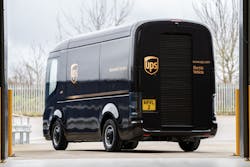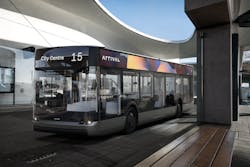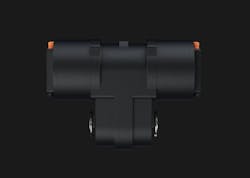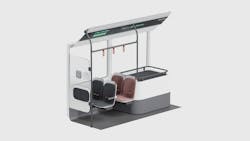Why is UPS Betting on the Arrival of a New EV?
The EV market has a lot of players in it. In addition to the traditional manufacturers dipping their toes in the water, tech-focused firms like Nikola, Tesla and Lordstown are each finding ways to differentiate their offerings and capture valuable market share. Of course, the market continues to grow as UK-based Arrival is emerging from its stealth mode.
But, what really makes Arrival different?
Simply put, the company's leadership team is adamant about reimagining the entire electric vehicle production process -- building from a blank slate rather then trying to force EV into traditional designs.
Instead, Arrival has focused on bringing some of the "coolest engineers" into the fold.More than half of the company's 1100+ employees are software engineers. "Together with the hardware engineers, they have designed a lot of our core components -- including our own chassis, powertrain, body and electronic controls. Obviously, we have a long roadmap of other products that we plan to develop. As a result, even at the very start of production for our vans about 60% of all the parts in the vehicle are vertically integrated. It's designed by us, made by us and controlled by us."
Target market
Arrival is initially focused on the commercial market -- and for good reason. A quick look any major highway across the world, it is easy to see that commercial vehicles are quite prevalent. Buses, delivery vans, garbage trucks -- all things that need to go in and out of city centers.
Every major city, every major company has goals of becoming much more green – and there has been progress, explains Yi. "But the current environment has really accelerated shareholders appetite for more concrete plans. As an individual you can make a choice to willingly pay 40- 50% more for an EV for any host of reasons. However, having worked in companies where we bought fleets of traditional internal combustion engine petrol or diesel vehicles, it's much harder to justify the costs when EVs cost double and you are spending shareholder money," she says. “This was the biggest challenges our founders faced in creating the company: How do we develop really cool, beautiful commercial vehicles at price parity? That's what has driven our approach, and it's made people take notice.”
Who's noticed?
Earlier this year, UPS announced a minority investment in Arrival as well as a commitment to purchase 10,000 electric vehicles to be purpose built for UPS with priority access to purchase additional electric vehicles.
UPS will collaborate with Arrival to develop a wide range of electric vehicles with Advanced Driver-Assistance Systems (ADAS). The technology is designed to increase safety and operating efficiencies, including the potential for automated movements in UPS depots. UPS will initiate testing ADAS features later in 2020.
“UPS continues to build an integrated fleet of electric vehicles, combined with innovative, large-scale fleet charging technology,” said Juan Perez, UPS chief information and engineering officer. “As mega-trends like population growth, urban migration, and e-commerce continue to accelerate, we recognize the need to work with partners around the world to solve both road congestion and pollution challenges for our customers and the communities we serve. Electric vehicles form a cornerstone to our sustainable urban delivery strategies. Taking an active investment role in Arrival enables UPS to collaborate on the design and production of the world’s most advanced electric delivery vehicles.”Hyundai and Kia also invested in Arrival early in 2020 to the tune of €100M. Through the course of the partnership, Arrival, Hyundai and Kia will use Arrival’s flexible skateboard platforms and technologies to create new purpose-built EVs across multiple vehicle categories. Hyundai and Kia will leverage Arrival’s novel micro factories and software innovation whilst Arrival will benefit from the OEM’s global footprint and economies of scale. This will help accelerate the ‘Two Track’ strategy adopted by Hyundai, to bring zero-emissions battery and fuel cell technologies to the commercial vehicle market.
Current progress?
Arrival is currently outfitting its micro factory north of London, which will focus on building vans. Arrival also has plans to open its first US micro factory, which will focus on the company’s bus offering, including an array of configurations to help with social distancing concerns. When it does open in the states, it plans to work heavily with US suppliers. "We are very mindful of ensuring that our supply chain isn't disrupted," says Yi.
About the Author
Peter Fretty
Technology Editor
As a highly experienced journalist, Peter Fretty regularly covers advances in manufacturing, information technology, and software. He has written thousands of feature articles, cover stories, and white papers for an assortment of trade journals, business publications, and consumer magazines.




